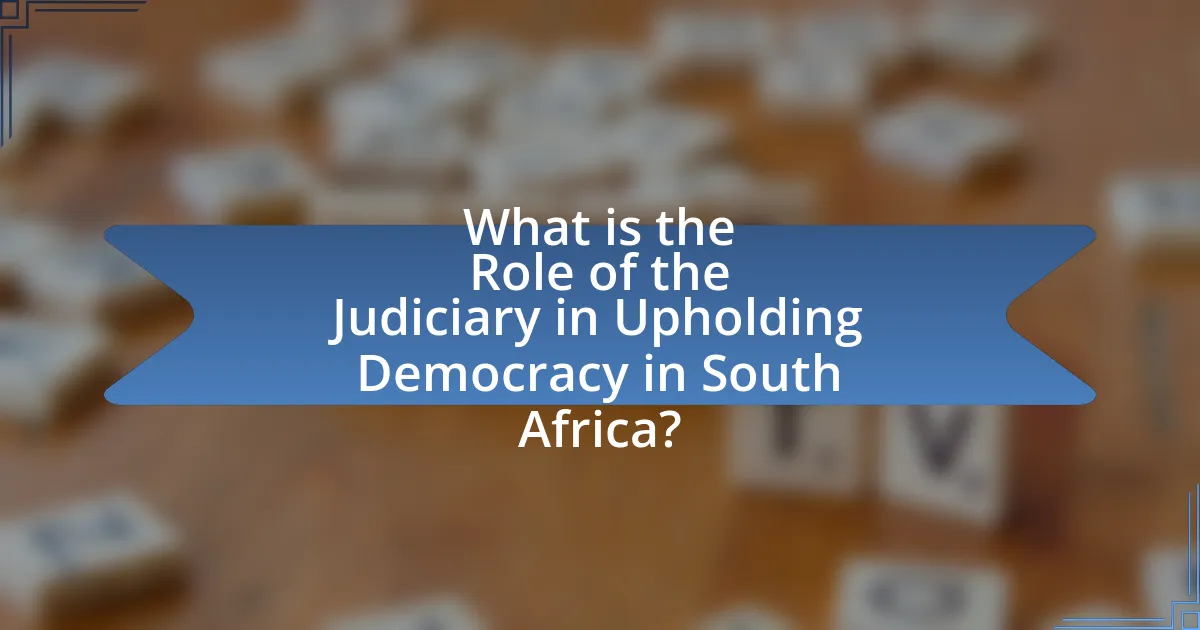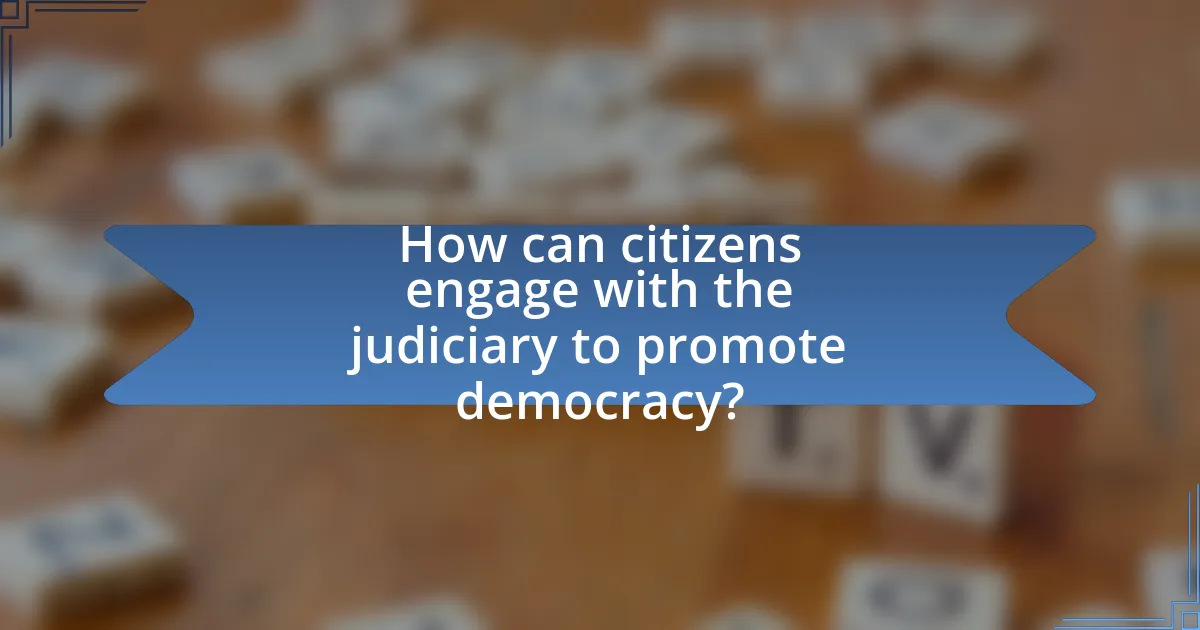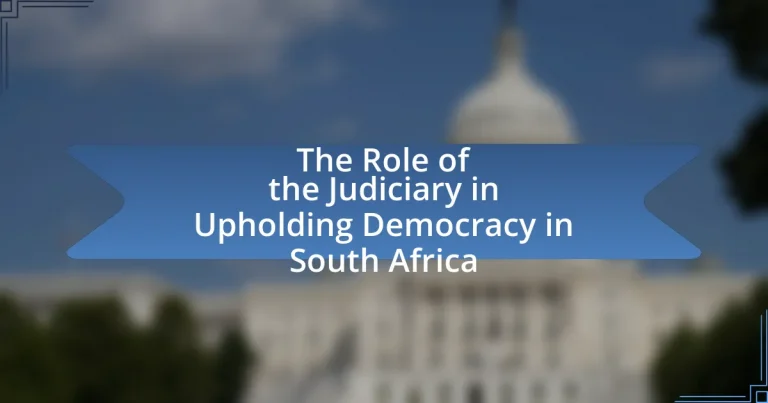The judiciary in South Africa plays a vital role in upholding democracy by interpreting and enforcing the Constitution, ensuring that laws and government actions align with constitutional principles. Key functions include safeguarding individual rights, maintaining the rule of law, and providing checks and balances on the executive and legislative branches. Landmark cases, such as Minister of Home Affairs v. Fourie, illustrate the judiciary’s commitment to equality and human rights. Challenges such as political interference and public perception issues impact judicial effectiveness, while the importance of an independent judiciary is emphasized as essential for protecting citizens’ rights and promoting accountability. The article also explores how citizens can engage with and support the judiciary to strengthen democratic values.

What is the Role of the Judiciary in Upholding Democracy in South Africa?
The judiciary in South Africa plays a crucial role in upholding democracy by interpreting and enforcing the Constitution, which is the supreme law of the land. This function ensures that laws and government actions comply with constitutional principles, protecting citizens’ rights and freedoms. The Constitutional Court, as the highest court, has the authority to review legislation and executive actions, striking down those that violate constitutional provisions. For instance, in the landmark case of Minister of Home Affairs v. Fourie (2006), the court ruled that the exclusion of same-sex couples from marriage was unconstitutional, reinforcing equality and human rights. Thus, the judiciary acts as a guardian of democracy, ensuring accountability and the rule of law in South Africa.
How does the judiciary contribute to the democratic framework in South Africa?
The judiciary in South Africa contributes to the democratic framework by ensuring the rule of law and protecting constitutional rights. It interprets and applies laws impartially, which upholds citizens’ rights as enshrined in the Constitution of South Africa, particularly in the Bill of Rights. For instance, the Constitutional Court has made landmark rulings that reinforce democratic principles, such as the case of Minister of Home Affairs v. Fourie, which legalized same-sex marriage, affirming equality and non-discrimination. This judicial oversight acts as a check on the powers of the executive and legislative branches, preventing abuses and ensuring accountability. By adjudicating disputes fairly and safeguarding individual freedoms, the judiciary plays a crucial role in maintaining a balanced and functioning democracy in South Africa.
What are the key functions of the judiciary in a democratic society?
The key functions of the judiciary in a democratic society include interpreting laws, protecting individual rights, and ensuring justice. The judiciary interprets legislation to apply it to specific cases, thereby clarifying legal standards and principles. It also safeguards individual rights by reviewing laws and government actions to ensure they comply with constitutional protections, as seen in landmark cases like Brown v. Board of Education, which reinforced the principle of equality. Furthermore, the judiciary ensures justice by resolving disputes impartially and upholding the rule of law, which is essential for maintaining public confidence in the legal system. These functions collectively uphold democracy by providing checks and balances on legislative and executive powers.
How does the judiciary ensure the rule of law in South Africa?
The judiciary in South Africa ensures the rule of law by interpreting and applying the Constitution, which serves as the supreme law of the land. Through judicial review, the courts can invalidate laws and actions that violate constitutional rights, thereby upholding legal standards and protecting individual freedoms. For instance, the Constitutional Court has made landmark rulings, such as the 2016 case of “Minister of Justice and Correctional Services v. Prisoners’ Legal Services,” which reinforced the rights of prisoners, demonstrating the judiciary’s role in maintaining accountability and justice. This function is critical in a democratic society, as it safeguards against arbitrary governance and ensures that all individuals and institutions are subject to the law.
Why is an independent judiciary essential for democracy?
An independent judiciary is essential for democracy because it ensures the rule of law and protects individual rights against arbitrary governance. This separation of powers allows the judiciary to act as a check on the executive and legislative branches, preventing abuses of power. For instance, in South Africa, the Constitutional Court has played a crucial role in upholding democratic principles by ruling against unconstitutional laws and actions, thereby reinforcing the accountability of government officials. Such judicial independence fosters public confidence in the legal system, which is vital for a functioning democracy.
What are the characteristics of an independent judiciary?
An independent judiciary is characterized by impartiality, autonomy, and accountability. Impartiality ensures that judges make decisions based solely on the law and facts, free from external pressures or influences. Autonomy refers to the judiciary’s ability to operate without interference from the executive or legislative branches, which is essential for maintaining the rule of law. Accountability involves mechanisms that hold judges responsible for their conduct and decisions, ensuring they adhere to ethical standards. These characteristics are vital for upholding democracy, as they protect individual rights and maintain public confidence in the legal system.
How does judicial independence protect citizens’ rights?
Judicial independence protects citizens’ rights by ensuring that judges can make impartial decisions free from external pressures or influences. This autonomy allows the judiciary to uphold the rule of law, which is essential for safeguarding individual rights and liberties. For instance, in South Africa, the Constitutional Court has played a crucial role in protecting rights enshrined in the Constitution, such as the right to equality and freedom of expression. The court’s independence enables it to challenge government actions that may infringe upon these rights, thereby reinforcing the principle that no one is above the law. This framework is vital for maintaining a democratic society where citizens can seek justice without fear of retribution or bias.
What challenges does the judiciary face in upholding democracy?
The judiciary in South Africa faces significant challenges in upholding democracy, primarily due to political interference, resource constraints, and public perception issues. Political interference can undermine judicial independence, as seen in instances where government officials attempt to influence court decisions or appointments. Resource constraints limit the judiciary’s ability to operate effectively, leading to backlogs and delays in case processing, which can erode public trust in the legal system. Additionally, public perception issues arise when citizens view the judiciary as biased or ineffective, often fueled by media portrayals or high-profile cases that attract attention. These challenges collectively hinder the judiciary’s role in maintaining democratic principles and ensuring justice.
How do political influences affect judicial decisions?
Political influences significantly affect judicial decisions by shaping the context in which judges operate and the interpretations of laws. For instance, in South Africa, the judiciary has faced pressures from political entities that may seek to influence rulings on key issues such as land reform and human rights. Historical examples include the Constitutional Court’s rulings on cases like the Nkandla judgment, where political considerations were evident in the public discourse surrounding the case. Additionally, the appointment processes for judges can be influenced by political affiliations, which may lead to biases in judicial outcomes. This interplay between politics and the judiciary underscores the challenges in maintaining judicial independence, as highlighted in various studies on the South African legal system.
What role does public perception play in the effectiveness of the judiciary?
Public perception significantly influences the effectiveness of the judiciary by shaping trust and legitimacy in the legal system. When the public views the judiciary as fair and impartial, it enhances compliance with court rulings and fosters respect for the rule of law. Conversely, negative perceptions can lead to skepticism about judicial decisions, undermining the authority of the courts. For instance, a 2020 survey by the South African Institute of Race Relations indicated that only 36% of South Africans expressed confidence in the judiciary, highlighting a disconnect that can impede judicial effectiveness. This correlation between public perception and judicial efficacy underscores the importance of transparency and accountability in maintaining a robust legal framework essential for democracy.
How does the judiciary interact with other branches of government?
The judiciary interacts with other branches of government through a system of checks and balances, ensuring that legislative and executive actions comply with the constitution. This interaction occurs when courts review laws passed by the legislature or actions taken by the executive, determining their constitutionality. For instance, in South Africa, the Constitutional Court has the authority to invalidate laws that violate constitutional rights, as seen in the landmark case of Minister of Home Affairs v. Fourie (2006), where the court ruled that the exclusion of same-sex couples from marriage was unconstitutional. This demonstrates the judiciary’s role in upholding democratic principles by safeguarding individual rights against potential overreach by the other branches of government.
What is the significance of checks and balances in South Africa?
Checks and balances in South Africa are significant as they ensure that no single branch of government—executive, legislative, or judiciary—can dominate or abuse power. This system promotes accountability and transparency, which are essential for a functioning democracy. For instance, the Constitutional Court plays a crucial role in reviewing legislation and executive actions, thereby safeguarding citizens’ rights as enshrined in the Constitution. The separation of powers is reinforced by mechanisms such as parliamentary oversight and judicial review, which collectively prevent the concentration of power and protect democratic principles.
How does the judiciary resolve conflicts between branches of government?
The judiciary resolves conflicts between branches of government by interpreting the law and ensuring that actions taken by the executive and legislative branches comply with the constitution. This role is crucial in maintaining the balance of power and protecting citizens’ rights. For instance, in South Africa, the Constitutional Court has the authority to review legislation and executive actions, as demonstrated in the case of Minister of Home Affairs v. Fourie (2006), where the court ruled that the exclusion of same-sex couples from marriage was unconstitutional. This illustrates how judicial review serves as a mechanism for conflict resolution, reinforcing the principle of checks and balances within the government.
What are the landmark cases that illustrate the judiciary’s role in democracy?
Landmark cases that illustrate the judiciary’s role in democracy include the case of Minister of Home Affairs v. Fourie (2006), where the Constitutional Court ruled that the prohibition of same-sex marriage was unconstitutional, affirming equality and human rights. Another significant case is S v. Makwanyane (1995), which abolished the death penalty in South Africa, reinforcing the value of life and human dignity. Additionally, The State v. Zuma (2006) highlighted the judiciary’s independence by allowing the prosecution of a former president, emphasizing accountability in governance. These cases collectively demonstrate how the judiciary protects democratic principles and upholds the rule of law in South Africa.
How have specific court rulings shaped democratic principles in South Africa?
Specific court rulings in South Africa have significantly shaped democratic principles by reinforcing the rule of law, protecting human rights, and ensuring accountability of government actions. For instance, the Constitutional Court’s ruling in the case of Minister of Home Affairs v. Fourie (2006) recognized the right to same-sex marriage, thereby affirming equality and non-discrimination as core democratic values. Additionally, the ruling in the case of Economic Freedom Fighters v. Speaker of the National Assembly (2016) emphasized the importance of parliamentary accountability and transparency, which are essential for a functioning democracy. These rulings illustrate how the judiciary actively upholds democratic principles by interpreting the Constitution in ways that promote justice and equality for all citizens.
What impact did the Constitutional Court’s decisions have on human rights?
The Constitutional Court’s decisions have significantly advanced human rights in South Africa by interpreting and enforcing the Bill of Rights. These rulings have established legal precedents that protect individual freedoms, such as the right to equality, freedom of expression, and the right to privacy. For instance, in the landmark case of Minister of Home Affairs v. Fourie (2006), the Court ruled that the exclusion of same-sex couples from marriage violated the right to equality, thereby expanding the scope of human rights protections. Additionally, the Court’s commitment to upholding the rule of law has reinforced democratic principles, ensuring that government actions are subject to judicial review and accountability.
How do landmark cases reflect the judiciary’s commitment to justice?
Landmark cases reflect the judiciary’s commitment to justice by establishing legal precedents that uphold constitutional rights and promote social equity. For instance, the landmark case of Minister of Home Affairs v. Fourie (2006) demonstrated the judiciary’s role in advancing equality by recognizing same-sex marriage as a constitutional right, thereby reinforcing the principle of non-discrimination enshrined in the South African Constitution. This case, along with others like S v. Makwanyane (1995), which abolished the death penalty, illustrates how judicial decisions can shape societal norms and protect individual freedoms, affirming the judiciary’s dedication to justice and democracy in South Africa.
What lessons can be learned from the judiciary’s role in South Africa?
The judiciary’s role in South Africa teaches the importance of judicial independence and the protection of constitutional rights. The Constitutional Court has played a pivotal role in upholding democracy by ensuring that laws align with the Constitution, as seen in landmark cases like the 2016 ruling on the public protector’s powers, which reinforced accountability in government. Additionally, the judiciary’s commitment to social justice is evident in its decisions that address issues such as land reform and access to healthcare, demonstrating its function as a guardian of the marginalized. These examples illustrate how a robust judiciary can serve as a check on power and promote the rule of law, essential for a thriving democracy.
How can other nations benefit from South Africa’s judicial experiences?
Other nations can benefit from South Africa’s judicial experiences by adopting its constitutional framework that emphasizes human rights and the rule of law. South Africa’s judiciary has played a crucial role in interpreting and enforcing constitutional rights, as evidenced by landmark cases such as the 1996 case of S v. Makwanyane, which abolished the death penalty and reinforced the value of life and dignity. This commitment to human rights can serve as a model for countries seeking to strengthen their own judicial systems and promote democratic values. Additionally, South Africa’s approach to judicial independence and accountability can provide valuable lessons for nations aiming to enhance the integrity and effectiveness of their legal institutions.
What best practices can be adopted to strengthen judicial independence?
To strengthen judicial independence, best practices include ensuring secure tenure for judges, providing adequate funding for the judiciary, and establishing transparent appointment processes. Secure tenure protects judges from political pressure, as evidenced by the constitutional provisions in South Africa that safeguard judges’ positions until retirement age. Adequate funding allows the judiciary to operate effectively without external influence, which is supported by the principle that an independent judiciary requires financial autonomy. Transparent appointment processes, such as those outlined in the Judicial Service Commission Act, promote accountability and public trust, thereby reinforcing the judiciary’s role in upholding democracy.

How can citizens engage with the judiciary to promote democracy?
Citizens can engage with the judiciary to promote democracy by participating in public interest litigation, which allows them to challenge laws or actions that infringe on democratic rights. This form of engagement has been pivotal in South Africa, where landmark cases, such as the Constitutional Court’s ruling in the case of Minister of Home Affairs v. Fourie (2006), demonstrated how citizen involvement can lead to significant legal reforms that uphold democratic principles. Additionally, citizens can attend court proceedings, submit amicus curiae briefs, and advocate for judicial accountability, thereby fostering a more transparent and responsive judicial system that aligns with democratic values.
What are the ways citizens can support judicial independence?
Citizens can support judicial independence by actively participating in civic education and advocacy efforts. Engaging in public discussions about the importance of an independent judiciary helps raise awareness of its role in democracy. Additionally, citizens can support organizations that promote judicial integrity and accountability, such as legal aid groups and watchdog organizations. Voting for representatives who prioritize judicial independence and reforming laws that undermine it are also crucial actions. Research indicates that public support for judicial independence correlates with stronger democratic institutions, as seen in various studies on governance and rule of law.
How can public awareness campaigns enhance understanding of the judiciary’s role?
Public awareness campaigns can enhance understanding of the judiciary’s role by effectively communicating its functions, responsibilities, and significance in upholding democracy. These campaigns utilize various media platforms to disseminate information about judicial processes, landmark cases, and the importance of an independent judiciary, thereby demystifying legal concepts for the general public. For instance, initiatives like the South African Judicial Education Institute’s outreach programs have been shown to improve public knowledge about court operations and rights, fostering greater trust in the legal system. By engaging citizens through workshops, social media, and informational materials, these campaigns empower individuals to recognize the judiciary’s critical role in protecting rights and maintaining the rule of law, ultimately strengthening democratic values in society.
What role do civil society organizations play in promoting judicial accountability?
Civil society organizations play a crucial role in promoting judicial accountability by advocating for transparency, monitoring judicial processes, and engaging in public education. These organizations often conduct research and publish reports that highlight issues within the judiciary, thereby raising awareness and prompting reforms. For instance, organizations like the Legal Resources Centre in South Africa have been instrumental in challenging judicial misconduct and ensuring that the judiciary remains answerable to the public. Their efforts contribute to a more informed citizenry, which is essential for holding judicial systems accountable and upholding democratic principles.
What practical steps can individuals take to advocate for a strong judiciary?
Individuals can advocate for a strong judiciary by actively participating in civic engagement initiatives, such as attending public forums and discussions about judicial matters. Engaging with local representatives to express support for judicial independence and funding is crucial, as it directly influences the judiciary’s capacity to function effectively. Additionally, individuals can support organizations that promote judicial reform and accountability, such as the South African Judicial Service Commission, which plays a vital role in maintaining the integrity of the judiciary. Research indicates that public awareness and advocacy can lead to increased governmental support for judicial systems, thereby strengthening democracy.
How can citizens participate in judicial reform initiatives?
Citizens can participate in judicial reform initiatives by engaging in advocacy, providing public feedback, and participating in community discussions. Advocacy efforts can include joining or forming organizations that focus on judicial reform, which can amplify their voices and influence policy changes. Public feedback can be submitted during consultations or public hearings organized by governmental bodies, allowing citizens to express their views on proposed reforms. Additionally, participating in community discussions or forums can help raise awareness and foster dialogue about the importance of judicial reform, ultimately contributing to a more informed and active citizenry in the democratic process.
What resources are available for educating the public about the judiciary?
Resources available for educating the public about the judiciary include government websites, educational programs, and community outreach initiatives. For instance, the South African Judiciary’s official website provides comprehensive information on court processes, legal rights, and access to justice. Additionally, organizations like the Legal Aid South Africa offer workshops and seminars aimed at increasing public understanding of legal systems. Community initiatives, such as school programs and public lectures, further enhance awareness and engagement with judicial matters. These resources collectively aim to empower citizens with knowledge about their rights and the functioning of the judiciary, thereby promoting informed participation in democracy.


